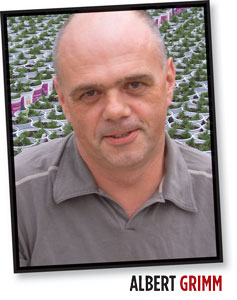9/30/2015
Uncharted Territories
Albert Grimm

Some years ago, we adopted an older cockatiel, a neurotic bird that had become unmanageable for the previous owners. Cockatiels are social animals and our bird loves to sit on shoulders for companionship. At the same time, he viciously nips at earlobes and fingers when they’re too close for comfort. The poor animal is torn between the need for social contact and the urge to defend itself. The bird doesn’t “want” to bite; he simply acts on instinct. If we respond with punishment, the animal becomes only more agitated and more entrenched in instinctive behavior. But if we respond with intellect, conscious effort and a cool head, we can calm the animal and get it to adopt new behaviors and closer bonding. The bird is happier and so are we.
Human instincts aren’t so different from those that we observe in our pets. Territorial behavior is just as innate to the human ego as it is to birds. The perception that someone trespasses into our comfort zone causes us to feel threatened and our response is driven by instinct, not by intellect. Adrenaline and reflexes take over. We may no longer bite intruders, but the verbal equivalent can be equally hurtful.
Modern life has morphed the nature of human territory, but our fundamental behavior hasn’t changed. Our homes are still our castles and good neighbors are expected to respect property lines. At work, we define our territory by titles, seniority, pecking orders and by departmental authorities. If anyone dares to offer suggestions or critiques that involve our work, we perceive it as an intrusion into our safe-zone. We don’t intend to hurt perceived intruders when we lash out in such situations, but our instinctive aggression turns many relationships into collateral damage. We suffer from stress and frustration, and the company suffers from lack of innovation and cooperation.
Once you recognize instinctive behavior, you can begin to manage it. Conscious, cool-headed coaching can be a powerful tool to deflate any budding argument. An impulsive response doesn’t resolve impulsive aggression, but if you can make a conscious effort to boost the self-esteem of defensive co-workers, it will make them more comfortable around you.
Try to recognize your own instinctive response to any perceived intruder. It’s best to walk away from any confrontation as soon as you feel adrenaline pump up your reflexes. A brisk, long walk around the greenhouse keeps you from harm and makes you feel better. LLM—Large Muscle Movement—is a proven method to conquer anxiety.
Try to find the courage to listen to what you need to hear, and if you do find someone bold enough to tell you, then encourage them to do so. Resist the urge to become defensive, otherwise, you’ll be told only what you want to hear. You can ask any consultant or technical advisor about this aspect of human interaction. Successful operators will engage in the challenges that an expert can offer and they will coach their staff to do the same. The remainder will continue to take offense at even the most humble critique. If you don’t allow anybody to challenge your status quo, then you’ll continue to needlessly defend your own limitations.
The greatest learning experience in my career was given to me by a consultant, who went through my greenhouse, and with brutal honesty, showed me everything that I did wrong. Initially, I reacted with anger, drama and severe sulking. It was the same consultant, however, who then helped me with great patience to step beyond my injured ego. He showed me how much opportunity lies outside the safe limits of the territory that I had staked out for myself. In the words of Henry Ford: “If you always do what you’ve always done, you’ll always have what you’ve always had.”
GT
Albert Grimm is head grower for Jeffery’s Greenhouses in St. Catharines, Ontario, Canada.